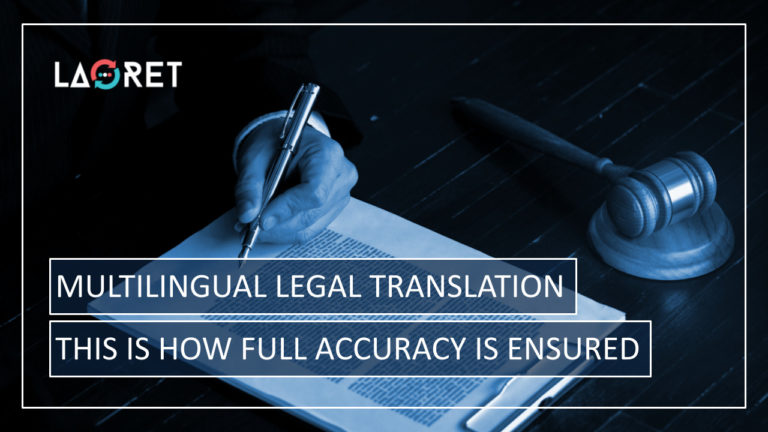Multilingual Legal Translation: This Is How Full Accuracy Is Ensured
As our global connections grow, so do legal translation services. Legal documents and translation can come in many different forms including contracts, certificates, patents & trade licensing, immigration documents, official court documents, wills & trusts, court interpreters, and so on.
But what best practices does a professional language services provider follow in order to ensure quality, accuracy, and consistency of these documents and services? Or, in other words, what kind of quality should you expect when using legal translation services? Read on!
The Vital Building Blocks Of Legal Translation
Perhaps the question of what is legal translation? will seem like a very simple one to answer as in that it involves the transformation of legal documents, or any documents used for legal purposes, from one language into another. But to think that legal translation is only dependent on language is only the half-truth. Legal translation is one of the most demanding translation services as it is highly dependent on both law and culture. The content will indeed need to be translated into the target language, but the legal system and terms prevailing in that country will also need to be respected. So, what does this mean specifically? Let’s dive into it a bit more deeply!

Accuracy And Consistency Through Careful Terminology Management
With legal documents, possible errors and ambiguities can have serious consequences. They need to be straightforward and must be delivered with complete clarity and accuracy. In this, make sure that the LSP you select offers ISO 9001 and ISO 17100 Certified Translation Services so that both quality and security standards will be met.
Since they are built from specific legal terminology, strict protocols, and formalities unique to each jurisdiction, human translation is paramount. This is why each linguist will follow the rigorous Translation, Editing, and Proofreading process (TEP), which prioritizes consistency and precision down to the letter. However, there’s a certain level of automation that has to be implemented in order to achieve accuracy and consistency in an efficient way. This is why any translation agency worth their salt will always create robust Translation Memories (TM), glossaries, and style guides.
A glossary is a master list with your business approved translation of words and terms which will be integrated within the Translation (CAT) Tool, so your Language Service Provider (LSP) knows exactly which translations to use constantly. The style guide will communicate more preferential rules such as style and tone.
The TM, on the other hand, is a vital part of efficient terminology management and provides suggested translations of industry-specific terminology, based on a database that has saved all previously translated work. The use of TM is highly beneficial in terms of:
- Delivering translations within the shortest possible turnaround time and for the lowest possible rate for your translation. It is possible that this is not your first legal translation and you have been translating for a while. This means that you already have a giant backlog of translated terms. So, having a database that automatically determines terms and how they should be translated will boost your efficiency greatly in the long run. In other words, you will not need to reinvent the wheel and your content will project clarity and consistency.
- Keeping you free of any risks in liability and usability, in terms of misunderstandings that stem from inconsistent or wrong legal terms.
Pro tip! There is a lot more to learn about Terminology Management! Check out our blog on Terminology Management: The Way To Consistent And Qualitative Translations, and learn all about it!
Familiarity With Laws And Regulations As Well As Language
Every country will have different legal codes. Not only the terminology matters but also the region and the culture. The technical but also the preferential terminology will need to be respected. For example, when it comes to Spanish translation services, there are outspoken differences in terminology, grammar, and expressions between European and Latin American Spanish. But even within Latin America itself, each country plays with legal language in a way that is unique to them.
The translator will also need to be aware of the regulations set in place for the document type you will need to be translated. For example, in many countries, there is a distinct separation between secular and religious law. In others, however, this division is rather vague. In Saudi Arabia, for example, the legal system is built on the laws of Islam. But out of the country’s desire to compete in global business, some secular laws have been added.
Regulations also go as far as to determine which kind of professional can translate a legal text. Every country will have a set of rules in how legal translators should be licensed. Oftentimes, a business degree, as well as a legal translation degree, will be required, while in others the state itself certified its translators and oaths must be sworn before they can be accredited.
Pro Tip! Want to read about some specifics regarding professional translations and regulations? Check out our blog “How Should European Union (EU) Documents Be Translated?â€, where we dive into the specific translations for the EU.
Security & Confidentiality
These days, a lot of translations are communicated through online platforms. And while it certainly helps from the perspective of speedy delivery, some clients might feel a bit apprehensive about sending their most sensitive documents through an online platform. That is why you should make sure that all communications and transactions between you and your provider are:
- Safeguarded by end-to-end encryption
- Protected by tightly constructed non-disclosure agreements for everyone involved in your translation projects.

How To Choose The Right Legal Translation Provider?
When you’re looking for an LSP for your legal translation professional, there are some key qualities they should possess in order to guarantee that all the above-mentioned building blocks are part of their translation strategy.
- The LSP works should hire translators with years of translation experience and familiarity with the unique terminology tied to the country and region you need the translation for. This is why the LSP should approach native, in-country linguists exclusively.
- Their translators should be familiar with the laws and regulations, which you can check by an LSP making a storing case for only hiring Subject Matter Experts and have proven experience in the legal industry and content type you require a translation into.
- The LSP should boast a quick response time and ideally be available 24/7. This is far more easily achieved with an LSP that offers services fully online.
- The LSP understands that strict confidentiality is essential in these types of translation exchanges and will have a workflow designed to meet this need. For this reason, as we mentioned before, they should sign a non-disclosure agreement and provide end-to-end encryption secured in all communications, so that any information handled by them will never leave the confines of the translation team.
Conclusion
Legal Translation services are in full swing, and as a result, the key rules that define quality legal translations should always be respected. As a service highly dependent on accuracy, privacy, speed, and confidentiality, the ideal translator will need to be a native, in-country subject matter expert with years of experience under their belt. They have to be highly aware of local laws and regulations and be part of a team where Translation (CAT) Tools are used to implement strict and efficient terminology management.
Laoret offers reliable Legal Translation Services provided by native, in-country interpreters highly experienced in the legal industry. Our intuitive Translation Management System (TMS) features a CAT Tool equipped to leverage advanced terminology management solutions. We adhere to a strict, streamlined workflow developed within full confidentiality to deliver top-quality products within your timeframe. We remain available 24/7 and protect all of our online interactions with end-to-end encryption.






